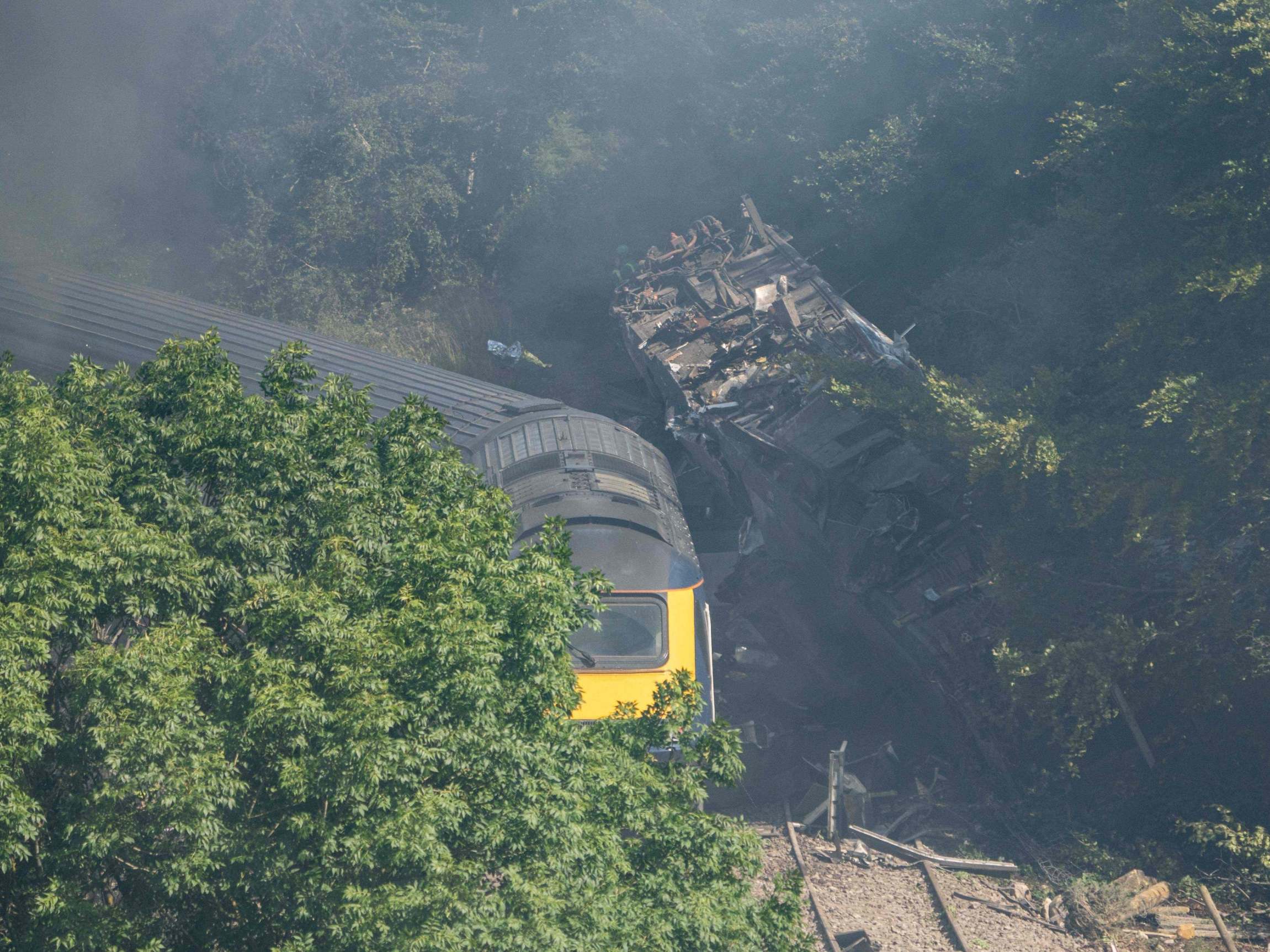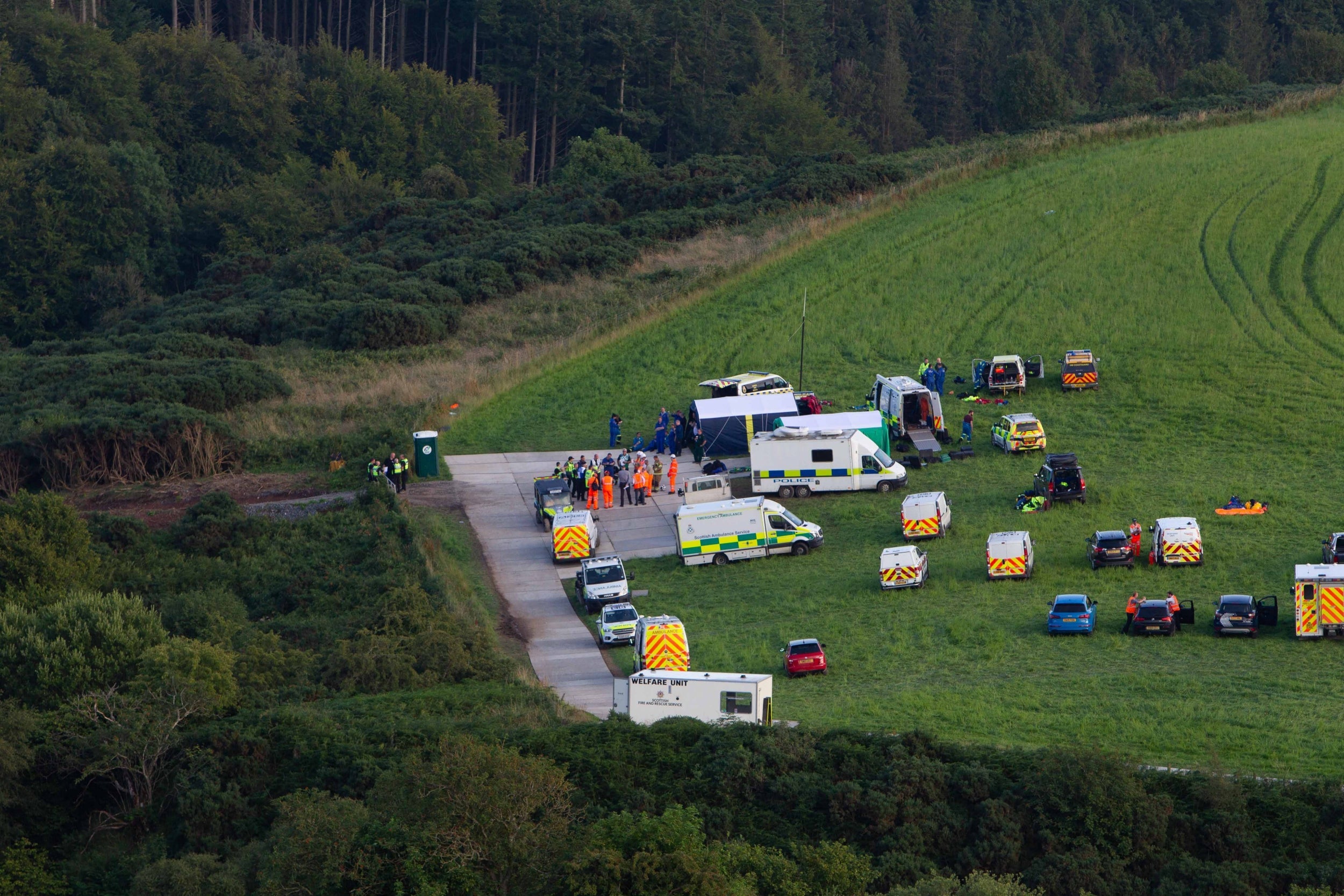Stonehaven train crash: Investigation into fatal derailment in Aberdeenshire begins
Network Rail warned it was failing to keep up with extreme weather just four weeks earlier

An investigation has begun into the Aberdeenshire train derailment that left three people dead on Wednesday.
Driver Brett McCullough, conductor Donald Dinnie, and a passenger were killed when the 6.38am Aberdeen to Glasgow Queen Street service crashed near Stonehaven amid heavy rain and flooding.
Six other people were injured and taken to hospital, as well as four firefighters who were hurt while dealing with the aftermath.
An investigation directed by the Crown Office and Procurator Fiscal Service, responsible for the prosecution of crime in Scotland, will now try to establish the cause of the incident.
The British Transport Police, the Rail Accident Investigation Branch and the independent safety regulator, the Office of Road and Rail (ORR), are also involved in the investigation.
The ScotRail train is suspected to have hit a landslip, causing a locomotive and three carriages to derail.
Network Rail, the owner and infrastructure manager of most of Britain’s railways, was warned it was failing to keep up with extreme weather events just four weeks before the incident.
An annual health and safety report by the ORR highlighted that there were six times more flooding events on Britain’s railways in 2019-20 than during the previous 12 months and noted a spike in landslips, demonstrating the “vulnerability” of the network.
The ORR found that Network Rail is “not keeping up with the frequency and severity of these events” in its plans to address climate change and extreme weather.
The report reads: “It is nearly inevitable that failures will occur.
“This is why Network Rail must focus on improving identification of imminent failure by means of remote monitoring and on refining the measures it has to respond to forecasts of extreme conditions.”
Speaking when the report was published in July, HM chief inspector of railways Ian Prosser said: “The last year saw significant increases in flooding, earthwork failures and trains striking trees on the line, which had a big impact on the number of delays on the network.
“It is so important that the sector employs best practice if we are to meet all the pressures on the network in the future and to make sure the railway plays its full role on climate change and reducing carbon emissions.”
Responding to the report, Network Rail said its railways were designed for a temperate climate and are “challenged” by prolonged periods of high and low temperatures, storms and floods.
It said it had drawn up “comprehensive plans” to address the changing weather, adding: “There is no quick fix but we will continue to review the way the railway operates in extreme weather and build resilience into all of our plans.”

Following the Stonehaven incident, Andrew Haines, the chief executive of Network Rail, said his firm is “acutely aware” it needs a long-term resolution to adapt to extreme weather events.
“Our railway is the safest major railway in Europe but it was designed for a temperate climate, and it’s challenged when we get extremes such as storms and floods,” he said on Thursday.
“We’re seeing more of these types of weather as our climate changes, and although we can usually address them on the ground, by slowing trains down or diverting them, we are acutely aware we need a long-term resolution, even more so after yesterday’s devastating event.
“As more detail emerges around exactly what happened and what went wrong, we will push on with our plans to build even more resilience into our railway so that it can run more safely and reliably.”
Wednesday’s fatal incident was the second time a train has derailed in the area in the past two years.
A previous incident in October 2018 left no one with injuries but caused major disruption.
Grant Shapps, the UK transport secretary, and Michael Matheson, the Scottish transport secretary, plan to visit the site on Thursday.
Mr Shapps said he wants to “ensure every measure is taken and that each lesson is learnt” from the tragedy.
Additional reporting by Press Association
Join our commenting forum
Join thought-provoking conversations, follow other Independent readers and see their replies
Comments
Bookmark popover
Removed from bookmarks